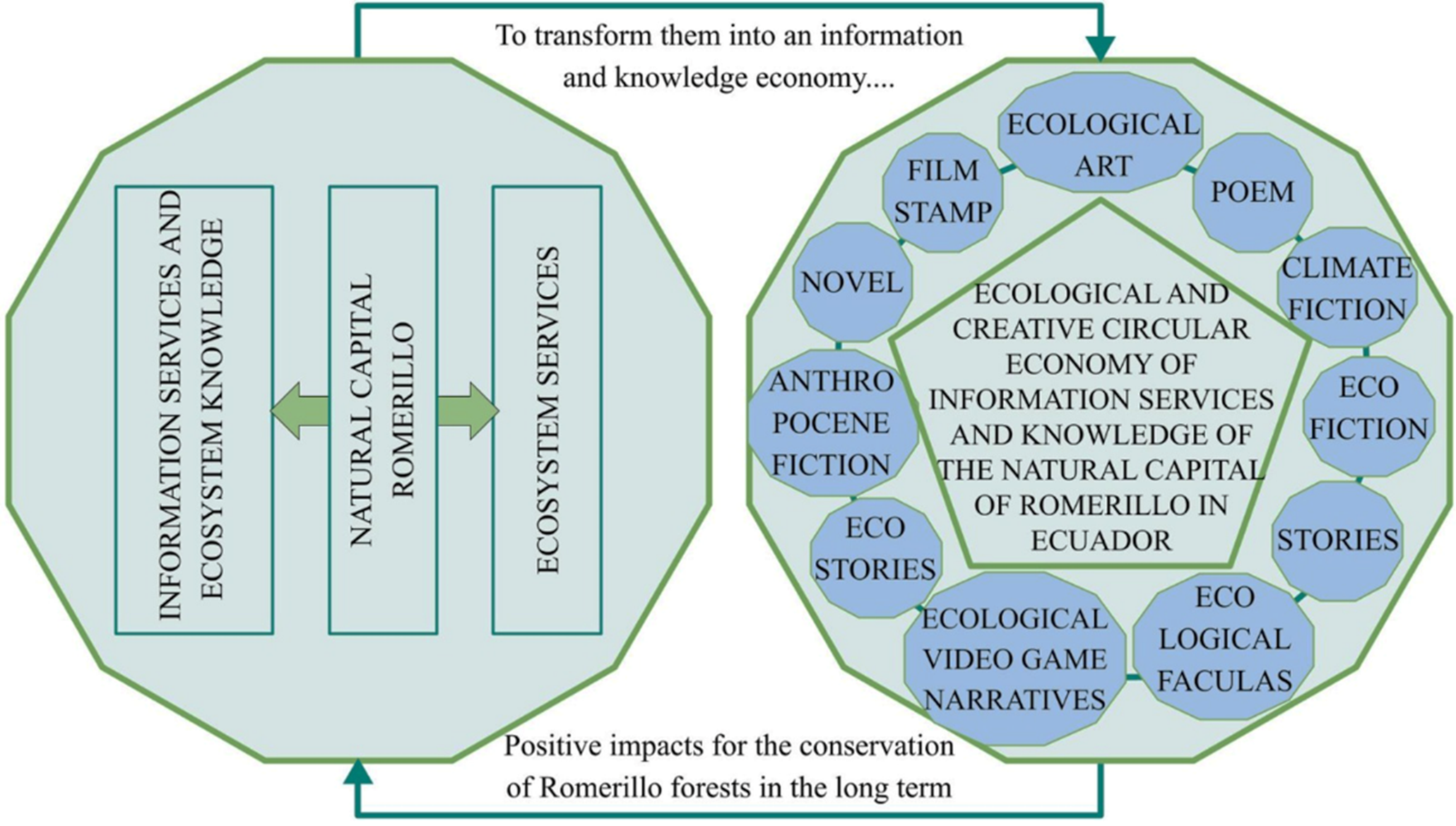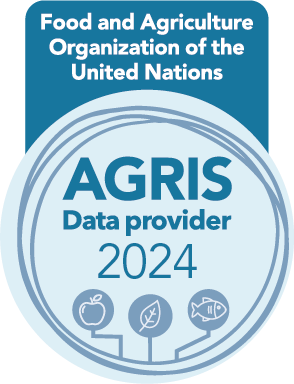Novo enfoque educacional para a sustentabilidade do capital natural florestal: revisão, análise e contribuições conceituais a partir da literatura científica sobre o "capital natural do romerillo"
DOI:
https://doi.org/10.17268/sci.agropecu.2024.002Palavras-chave:
deforestation, education on natural capital, economic-ecological-creative-intangible education, conservation of natural capital, Andean countriesResumo
The concept of Natural Capital of the Romerillo forests (NCR) has been little studied in relation to the Education of this important type of natural capital. However, currently, many researchers have argued that Education can contribute significantly to the teaching and learning of this natural capital. By investigating how the concept has been studied, this article has attempted to establish the direction, understanding and use of Education that the NCR may take in the future, within the context of research into an Intangible Creative Ecological Economy (ICEE). This study used an exploratory research methodology with secondary information, in combination with chronological, conceptual and thematic literature review techniques. The literature review indicates that Education on NCR has been used in three areas of research to explain or address a particular construct: (1) promotion of formal and informal programs for use of the intangible environmental services, (2) development of an ICEE that promotes biotrade of intangible services from the Romerillos forests, and (3) short- and long-term conservation of the Romerillos forests. For future studies, it is recommended to address the concept of Education in “Intangible Forest Natural Capital” as a strategy for the sustainable use of the intangible environmental services of the NCR, aiming to mitigate deforestation and preserve the forests of the Romerillos Andean.
Referências
Alola, A., & Akadiri, S. (2023). Drivers of sustainable natural capital, forest capital, and green growth in Sweden: Rise and fall scenario of material productivity. Ecological Indicators, 151, 110308. https://doi.org/10.1016/j.ecolind.2023.110308
Arce, R. (2020). Los bosques como capital natural. Revista Forestal del Perú, 35(2), 106-121. https://doi.org/10.21704/rfp.v35i2.1579
Bagstad, K. J., Ingram J.C., Shapiro, C.D., La Notte, A., Maes, J., Vallecillo, S., & Voigt, B. (2021). Lessons learned from development of natural capital accounts in the United States and European Union. Ecosystem Services, 52, 101359. https://doi.org/10.1016/j.ecoser.2021.101359
Barbier, E. B. (2019). The concept of natural capital. Oxford Review of Economic Policy, 35(1), 14-36.
Baumeister, R. F., & Leary, M.R. (1997). Writing Literature Reviews. Review of General Psychology, 1(3), 311-320.
Blandariz, S. R., Macías, A. E., Véliz, R. S., & Figueroa, F. J. (2023). Perception of biodiversity in the Pisloy community, Jipijapa, Manabí, Ecuador. South Florida Journal of Development, 4(5), 1906-1927. https://doi.org/10.46932/sfjdv4n5-006
Bonilla, J. A. (2014). Modelo Bio-económico forestal: tasa de descuento y rotación forestal en el caso del Romerillo blanco en Ecuador (Tesis de maestría). Universidad Nacional Agraria La Molina, Lima, Perú.
Bonilla, J. A., & Alarcón-Novoa, J. A. (2015a). Turnos técnico y económico de tala para árboles de Romerillo blanco en Ecuador. Ecología Aplicada, 14(2), 127-137.
Bonilla, J. A. (2015b). Los últimos refugios del Romerillo blanco, la única conífera nativa del Ecuador. Revista Perspectivas de Investigación, 13, 4-5.
Capriolo, A., Boschetto, R. G., Mascolo, R. A., Balbi, S., & Villa. F. (2020). Biophysical and economic assessment of four ecosystem services for natural capital accounting in Italy. Ecosystem Services, 46, 101207. https://doi.org/10.1016/j.ecoser.2022.101428
Cohen, F., Hepburn, C. J., & Teytelboym, A. (2019). Is Natural Capital Really Substitutable?. Annual Review of Environment and Resources, 44(1), 425–448. https://doi.org/10.1146/annurev-environ-101718-033055
Cordero, D., Moreno-Díaz, A., & Kosmus, M. (2008). Manual para el desarrollo de mecanismos de pago/compensación por servicios ambientales. Editorial GTZ.
Corona, S., & Kaltmeier, O. (2012). En diálogo. Metodologías horizontales en Ciencias Sociales (capítulo introductorio). Biblioteca de Educación. Gedisa Editorial. España.
Dalling, J., Barkan, P., Bellinghan, P., Healey, J., & Tanner, J. (2010). Ecology and distribution of neotropical podocarpaceae. In: Turner Benjamin L and Cernusak, Lucas A. Editors. Washington D.C.: Smithsonian Institution Scholarly Press. https://doi.org/10.5479/si.0081024X.95.43
Daly, H. E. (1990). Sustainable growth: An Imposibility Theorem. Journal of CID, 24, 45-47.
Dash, P. (2019). Analysis of Literature Review in Cases of Exploratory Research. Available at http://dx.doi.org/10.2139/ssrn.3555628
Davis, J., Mengersen, K., Bennett, S., & Mazerolle, L. (2014). Viewing systematic reviews and meta-analysis in social research through different lenses. Springer Plus, 3, 511. https://doi.org/10.1186/2193-1801-3-511
Dickie, I., & Neupauer, S. (2019). Natural capital accounts: nations and organizations. Journal of Environmental Economics and Policy, 8(4), 379-393. https://doi.org/10.1080/ 21606544.2019.1639219
Farrell, C. A., & Stout, J. C. (2020). Irish Natural Capital Accounting for Sustainable Environments: Stage 1 Feasibility Report. EPA, Ireland.
Fernández, R., Hernández, C., & Baptista, P. (2007). Fundamentos de metodología de la investigación. Editorial Mac Graw-Hill Interamericana.
Gálvez, J. Z., Aguirre, O., Sánchez, O., & López, N. (2003). Estado actual de conservación y posibilidades de manejo del Romerillo en la región suroccidental del Parque Nacional Podocarpus. Editorial Universidad Técnica Particular de Loja. Ecuador.
Geier, L (2020). Ecofiction definitions: all the hashtags [Video]. Consulted in: https://youtu.be/nEGlkae9UJE
Gómez-Baggethun E., & De Groot, R. (2008). Capital natural y funciones de los ecosistemas: explorando las bases ecológicas de la economía. Ecosistemas, 16(3), 4-14.
Guerry, A. D., Polasky, S., Lubchenco, J., Chaplin-Kramer, R., Daily, G.C., Griffin, R., & Vira, B. (2015). Natural capital and ecosystem services informing decisions: from promise to practice. Proceedings of the National Academy of Sciences, 112(24), 7348 - 7355. https://doi.org/10.1073/pnas.150375111
Grant, M. J., & Booth, A. (2009). A typology of reviews: an analysis of 14 types of reviews and associated methodologies. Journal of Libraries and Health Information, 26(2), 91-108. https://doi.org/10.1111/j.1471-1842.2009.00848.x
Hart, C. (1998). Doing a Literature Review: Releasing the Social Science Research Imagination. In: Sage Publications 1998. Doing a Literature Review: Releasing the Social Science Research Imagination. London.
Hein, L., Bagstad, K.J., Obst, C., Edens, B., Schenau, S., Castillo, G., & Caparrós, A. (2021). Progress in natural capital accounting for ecosystems. Science, 367(6477), 514–515. https://doi.org/10.1126/ciencia.aaz89
Hinson, C., O’Keefe, J., Mijic, A., Bryden, J., Van Grootveld, J., & Collins, A. M. (2022). Using natural capital and ecosystem services to facilitate participatory environmental decision making: Results from a systematic map. People and Nature, 22(4), 652-668. https://doi.org/10.1002/pan3.10317
Houdet, J., Ding, H., Quétier, F., Addison, P., & Deshmukh, P. (2020). Adapting double-entry bookkeeping to renewable natural capital: An application to corporate net biodiversity impact accounting and disclosure. Ecosystem Services, 45, 101104. https://doi.org/10.1016/j.ecoser.2020.101104
Jiménez-Herrero, L. (2001). Desarrollo Sostenible y Economía Ecológica. Integración, medio ambiente-desarrollo y economía-ecología. Madrid: Editorial Síntesis.
Kumagai, J., Wakamatsu, M., Hashimoto, S., Saito, O., Yoshida, T., Yamakita, T., & Managi, S. (2022). Natural capital for nature’s contributions to people: the case of Japan. Sustainability Science, 17, 919–954. https://doi.org/10.1007/s11625-020-00891-x
Leite, D. F., Padilha, M. A., & Cecatti, J. G. (2019). Approaching literature review for academic purposes: The literature review checklist. Clinics, 74, e1403. https://doi.org/10.6061/clinics/2019/e1403
Lorena, L., & Panhoca, L. (2021). Measurement of Natural Capital in academic journals. MOJ Ecology and Environmental Sciences, 6(2), 46‒52.
Lozano, D. C., & Yaguana, C.A. (2009). Composición florística, estructura y endemismo del bosque nublado de las reservas naturales: Tapichalaca y Numbala, Cantón Palanda, Provincia de Zamora, Chinchipe. Tesis de grado. Universidad de Loja, Loja- Ecuador.
Miller, T. (2007). Ciencia ambiental y Desarrollo sostenible: Un enfoque integral. 8a. Edición. Editorial Thomson Editores, S.A.
Mortensen, M. H. (2012). Understanding attractiveness in business relationships - A complete literature review. Industrial Marketing Management, 41(8), 1206-1218.
Neill, A. M., O’Donoghue, C., & Stout, J. C. (2020). A Natural capital lens for a sustainable Bioeconomy: Determining the unrealised and unrecognised services from nature. Sustainability, 12(19), 8033. https://doi.org/10.3390/su12198033
Özdemiroğlu, E. (2019). Natural capital – a practitioner’s overview of concepts and applications. Journal of Environmental Economics and Policy, 8(4), 343–352 https://doi.org/10.1080/21606544.2019.1639220
Padilla, S. (2020). Capital Natural. https://economipedia.com/definiciones/capital-natural.html.
Pan, Y., & Vira, B. (2019). Exploring natural capital using bibliometrics and social media data. Ecology and Society, 24(4), 5. https://doi.org/10.5751/ES-11118-240405
Pillai, V. (2020). Research Methodology: Literature Review. https://doi.org/10.13140/RG.2.2.19772.18560
Programa de las Naciones Unidas para el Medio Ambiente- PNUMA. (2010). Nuestro Planeta: El capital. Revista del Programa de las Naciones Unidas para el Medio Ambiente, 16(4), 1-30.
Radchenko, O., Kovach, V., Radchenko, O., Kriukov, O., Sydorchuk, L., Sharov, P., & Semenets-Orlova, I. (2021). Principles of natural capital preservation in the context of strategy of state environmental safety. E3S Web of Conferences, 280, 09024. https://doi.org/10.1051/e3sconf/202128009024
Rojas, A. (2005). Pinos colombianos: Ocho nativos en peligro. Revista El Mueble y la Madera. http://revista-mm.com/especies/pinos-colombianos-ocho-nativos-en-peligro/
S&P Global Ratings (2021). Natural Capital Valuation: An Incentive to Protect Nature? Pp.1-11.
Small, A. N., Paavola, J., & Owen, A. (2023). Multilevel natural Capital Implementation within planetary boundaries. Business Strategy and the Environment, 32(2), 3001-3013. https://doi.org/10.1002/bse.3282
Smith, G. S., Ascui, F., O'Grady, A. P., & Pinkard, L. (2021). Opportunities for natural capital financing in the forestry sector. National Institute for Forest Products Innovation, technical report project NT011, 1-53.
Sullivan, S. (2020). The Natural Capital Myth and Other Stories. The Dasgupta Interim Review on the Economics of Biodiversity - Feedback. Essays on Nature, Finance and Value(s) – by Sian Sullivan.
Webster, J., & Watson, R. T. (2002). Analyzing the past to prepare for the future: Writing a literature review. MIS Quarterly, 26(2), 13-23.
Wentland, S. A., Ancona, Z. H., Bagstad, K. J., Boyd, J., Hass, J. L., Gindelsky, M., & Moulton. J. G. (2020). Accounting for land in the United States: Integrating physical land cover, land use, and monetary valuation. Ecosystem Services, 46, 101178. https://doi.org/10.1016/j.ecoser.2020.101178
Wu, S., Hou, Y., & Yuan, G. (2010). Valoración de los bienes y servicios ecosistémicos y de capital forestal natural de la Municipalidad de Beijing- China. Unasylva, 61(234/235), 28-36.
Yaguana, C., Lozano, D., Neill, D., & Asanza, M. (2012). Diversidad florística y estructura del bosque nublado del Río Numbala, Zamora-Chinchipe, Ecuador: El "bosque gigante" de Podocarpaceae, adyacente al Parque Nacional Podocarpus. Revista Amazónica: Ciencia y Tecnología, 1(3), 226-247. https://doi.org/10.59410/RACYT-v01n03ep05-0019

Downloads
Publicado
Como Citar
Edição
Seção
Licença
Copyright (c) 2024 Scientia Agropecuaria

Este trabalho está licenciado sob uma licença Creative Commons Attribution-NonCommercial 4.0 International License.
Los autores que publican en esta revista aceptan los siguientes términos:
a. Los autores conservan los derechos de autor y conceden a la revista el derecho publicación, simultáneamente licenciada bajo una licencia de Creative Commons que permite a otros compartir el trabajo, pero citando la publicación inicial en esta revista.
b. Los autores pueden celebrar acuerdos contractuales adicionales separados para la distribución no exclusiva de la versión publicada de la obra de la revista (por ejemplo, publicarla en un repositorio institucional o publicarla en un libro), pero citando la publicación inicial en esta revista.
c. Se permite y anima a los autores a publicar su trabajo en línea (por ejemplo, en repositorios institucionales o en su sitio web) antes y durante el proceso de presentación, ya que puede conducir a intercambios productivos, así como una mayor citación del trabajo publicado (ver efecto del acceso abierto).




